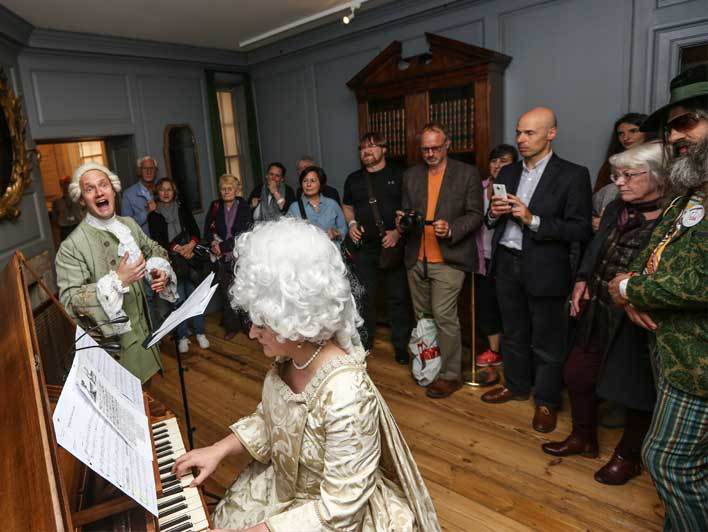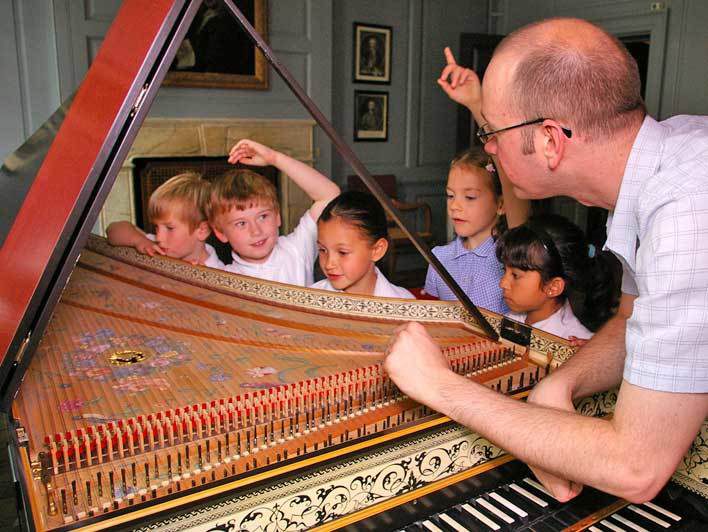TOLOMEO (HWV 25)
Libretto: Nicola Francesco Haym, after Carlo Sigismondo Capece
First performance: 30th April 1728, King's Theatre, London
Cast
- Francesco Bernardi, called "Senesino" (Alto-castrato)
- Francesca Cuzzoni (Soprano)
- Faustina Bordoni (Soprano)
- Antonio Baldi (Alto-castrato)
- Giuseppe Maria Boschi (Bass)

Synopsis
Act I
Tolomeo, eldest son of Cleopatra, is in exile on the island of Cyprus disguised as a shepherd called Osmin. His mother has usurped him and put his younger brother, Alessandro, on the throne. To add to his woes, Tolomeo believes that his beloved wife Seleuce has been drowned at sea in a shipwreck. In despair he prepares to throw himself into the sea, but is halted by a cry of distress. He sees a figure battling the rough seas and wades in to rescue him. The man collapses unconscious at his feet, and Tolomeo is astonished to see that it is his brother, Alessandro. On the point of killing him in revenge, he halts and decides to let him live so that Alessandro will be twice beholden to him.
Elisa, the sister of Araspe the king of Cyprus, now enters. She finds the sleeping Alessandro and wakes him. On waking Alessandro instantly falls in love with Elisa, and agrees to retire to her villa to revive. Elisa reveals her love for the shepherd ‘Osmin’.
Seleuce, who has not been killed at sea, is searching for her exiled husband, disguised as the shepherdess Delia. She is pursued by Araspe who loves her. But she rejects him, and he leaves to welcome Alessandro. Seleuce declares her undying love for Tolomeo.
Elisa arrives at ‘Osmin’s’ hut and tries to persuade him to forgo his pastoral idyll for life at court. He resists, so she invites him instead to her villa. Recognising Elisa’s love for him, Tolomeo confirms his desire to revenge his wife’s supposed death. Finding comfort in his anger, he falls asleep.
Seleuce enters, still searching for her husband. Seeing the sleeping shepherd she thinks she recognises him as Tolomeo, and draws closer to confirm her hopes. Araspe enters and watches her approach the shepherd, uttering words of love. In a jealous rage, Araspe rushes forward with sword drawn and threatens to kill his apparent rival. Seleuce runs away in alarm, calling back to the shepherd to wake and save himself. Tolomeo wakes and thinks he hears his wife’s voice in his dreams. Seeing Araspe with sword raised Tolomeo begs for death. Araspe accuses him of being ‘Delia’s’ lover but Tolomeo denies this. Unconvinced, Araspe lets the shepherd live but tells him to leave immediately. Left alone, Tolomeo prays to hear his wife’s voice again, for with her return all his sorrows will be at an end.

Act II
Elisa is searching for ‘Osmin’, when Tolomeo enters. He reveals his identity to her, but they are interrupted by Araspe who is furious to see the banished ‘Osmin’ still on the island. Elisa persuades Araspe to trust the shepherd to her care, and she offers to help Tolomeo.
Seleuce longs for her lost husband. Elisa enters with Tolomeo, who instantly recognises Seleuce. But, in order to protect him, she pretends not to know who he is. Elisa now has confirmation of her suspicions. She offers to help Tolomeo regain his throne if he will declare his love for her. But he refuses, declaring that only Seleuce is worthy of his love. Left alone Elisa’s thoughts turn to revenge.
She is joined by Alessandro, who has won Araspe’s agreement to his union with Elisa. But she cannot consider his affection until he has strengthened his claim to his throne by killing his brother, Tolomeo. Alessandro now faces a dilemma, as he has decided to restore Tolomeo to his rightful place as Prince of Egypt. He is at once attracted by Elisa’s beauty and repelled by her harshness.
Tolomeo and Seleuce continue to search for their lost love, echoing each other’s words. Araspe appears and attempts to embrace ‘Delia’. Tolomeo leaps to her defence, and reveals his true identity to Araspe. Inspired by her husband, Seleuce too reveals who she is and begs Araspe to spare them. But the King is resolute, and has the couple bound and taken away as they bid each other a despairing farewell.

Act III
In Araspe’s palace Alessandro has received news of the death of his mother Cleopatra, and mourns her. Araspe arrives and tells Alessandro that he has arrested Tolomeo, advising him to execute his brother. Alessandro pretends to want his brother returned to Egypt in chains, though he plans secretly to restore him to the throne. Araspe believes that Alessandro does not want the death of his brother on his own hands, and decides to kill Tolomeo himself.
Elisa is holding Seleuce captive. She tells Seleuce that to save Tolomeo’s life she must convince him to marry Elisa. When Tolomeo arrives Seleuce tries to persuade him to accept Elisa’s hand, but he is steadfast. He would rather die than submit. In her anger Elisa anticipates executing the devoted couple.
In the woods near the palace, Alessandro rescues Seleuce from Elisa’s guards. She is afraid of him, believing he has already killed Tolomeo. But he assures her that he will return his brother to the throne, and begs forgiveness of her. Selecue begins to believe that there might be a happy ending to her misery.
Tolomeo has been given poison by Elisa and, bidding farewell to his beloved Seleuce, he willingly drinks it. He falls to the ground.
Araspe leads Alessandro to his brother’s body, who is horrified and warns Araspe that he will pay for this murder. But all Araspe can think about is Seleuce, who is now free to marry him. Elisa announces that she has had Seleuce put to death, and confides to Alessandro that she has given Tolomeo a sleeping draught rather than poison. Tolomeo now begins to wake, and as he does Alessandro leads in the rescued Seleuce. The couple are finally reunited in freedom, and Alessandro is reconciled with his brother. Tolomeo forgives all and prepares to reclaim the throne of Egypt.
Context
Tolomeo was the final presentation of the 1728 winter season of the Royal Academy of Music. Although he did not know it at the time, it was the last occassion on which Handel would write for the Royal Academy, and the last time he would write for the infamous pairing of the ‘Rival Queens’ Faustina and Cuzzzoni.
The Royal Academy had never been on an entirely sound financial footing, relying as it did on a board of subscribers who often disagreed with each other, or withheld their subscription depending on their own personal financial situation or their waning interest in the Italian opera. The enormous salaries paid to the Italian singers were proving ruinous, and by the end of the season it was clear that things could not continue as they were.
On 31st May 1728 the ‘Daily Courant’ carried the following notice:
The General Court of the Royal Academy of Musick stands adjourn’d till 11 a-Clock on Wednesday 5th June next, in order to consider of proper Measures for recovering the Debts due to the Academy, and discharging what is due to Performers, Tradesmen, and others; and also to determine how the Scenes, Cloaths, etc. are to be disposed of, if the Operas cannot be continued.”
N.B. All the Subscribers are desired to be present, since the whole will be then decided by Majority of Votes.”
The season finished earlier than usual, on 1st June 1728, and the Kings Theatre was closed for nearly a year. In the meantime, Senesino, Cuzzoni and Faustina returned to their engagements on the Continent.
Handel, however, was proving to be more financially successful. Between June and August he purchased £1,100 of South Sea Annuities in a series of transactions recorded in the records of his dealings with the Bank of England, which had recently opened its first permanent building in Threadneedle Street. He sold £50 worth in August before travelling to Italy to select singers for the next opera season in London. Possibly he needed the ready cash to pay for expenses on his journey. It seems clear that, regardless of the future of the Royal Academy, Handel was intent on providing Italian opera for London.
And, indeed, he succeeded. On 18th January 1729, Viscount Percival wrote to a friend:
“I went to a meeting of the members of the Royal Academy of Musick: where we agreed to prosecute the subscribers who have not yet paid; also to permit Hydeger and Hendle to carry on operas without disturbance for 5 years and to lend them for that time our scenes, machines, clothes, instruments, furniture, etc. It all past off in a great hurry, and there was not above 20 there.”
Handel was about to go into private opera production with John Jacob Heidegger, who had controlled the licence of the Kings Theatre for many years. He returned to the continent on another talent-scouting mission, and began work on a new opera for the opening of the 1729 season.


